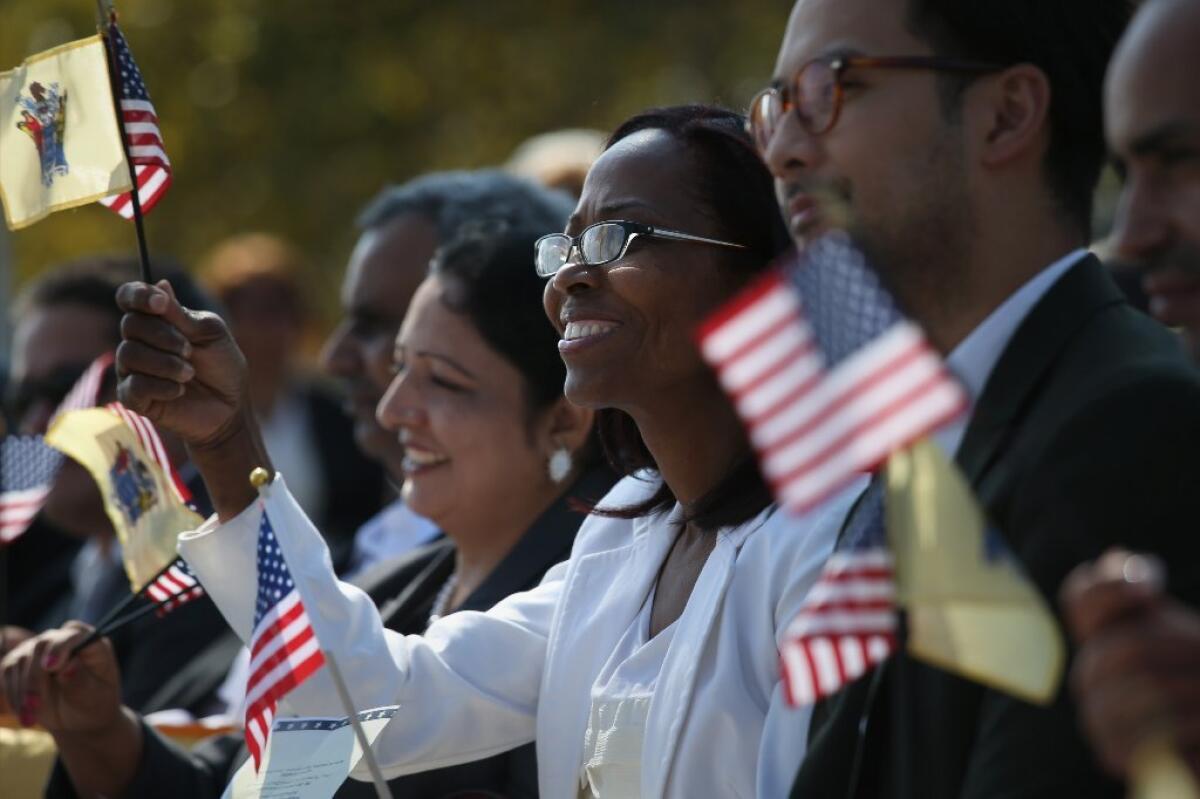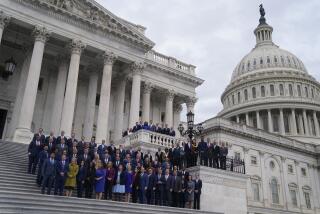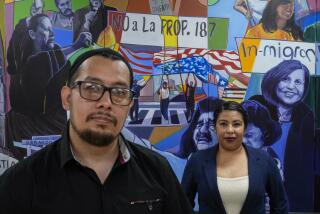Readers React: 21st century citizenship: Readers on being American

In an editorial Sunday, The Times posed several questions -- on the importance of English proficiency, whether dual nationalities should be recognized, if a path to citizenship is the only way to legalize millions of undocumented immigrants and more -- that go to the heart of what it means to be an American citizen in the 21st Century.
Judging by the few dozen letters we’ve received in response, readers have been thinking about -- and in some cases, answering -- these questions for some time.
The largest chunk of readers wrote in favor of more narrowly defining American citizenship, including curtailing the prevalence of dual nationalities, supporting mastery of the English language as a prerequisite for naturalization, and addressing unauthorized immigration. Others implored Americans to exercise their citizenship as voters and more active participants in democracy, and several spoke up for immigrants who risked their lives to come to this country.
Below are several letters, some of which may run in print later this week, that jumpstart the conversation with readers on the meaning of citizenship in the modern age. As The Times publishes more editorials and blog posts on this subject in the coming weeks, part of that conversation will continue to play out here.
Jack Salem of Los Angeles advocates for non-hyphenated Americanism:
How refreshing that The Times framed, with all its contentious subsets, the question of American citizenship. Resolution of these issues goes to the heart of what it means to be American.
Add to your list an extension of what Harvard professor Samuel P. Huntington said: that immigrants from Spanish-speaking countries threaten “to divide the United States into two peoples, two cultures and two languages.” It’s graver than that since it’s become politically correct to separate us into hyphenated Americans, including Asian American, African American and Mexican American.
In the past, the whole idea was to shed individual nationhoods and become American. Teddy Roosevelt spoke about that imperative, about the need to discard hyphenations and previous loyalties.
And finally, let’s stop equating the immigrants who came here legally from those who’ve entered illegally. There is a difference.
Huntington Beach resident Ben Miles mentions a more universal bond than citizenship:
For me, citizenship is akin to the proverbial fish to water analogy. I don’t seem to feel it or even consider it because I’m so immersed in it. Nevertheless, I’m grateful to The Times for posing the question, “What does citizenship mean to you?”
The first thought that comes to mind is compassion. The immigrants I know of, here legally or not, are hard at work attempting to provide for their families. Moreover, the restaurant and food industries in California would come to a halt if not for the dedicated labor of immigrants, here legally or not.
Remember, first and foremost, we are inhabitants of this good Earth. That’s a bond more common and basic than even citizenship.
Joanne Zirretta of Aliso Viejo takes an active view of citizenship:
To me, the essence of America is that self-government is possible and that we are all equal under the law. To protect the first and make the second reality, American citizenship obligates us to be both informed and active.
Study American history as a lifelong pursuit. Respond loudly when journalists expose public corruption and injustice. Examine the issues and candidates put before us, and then vote. Contact our representatives so they know we are watching. Show up at a city hall meeting or wave a protest sign.
Do something, anything, because American citizenship should not be a spectator sport. Otherwise, we might as well just have a king.
William O. Holston Jr. says his work with immigrants informs his perspective on citizenship:
I have been providing pro bono legal help to asylum seekers for more than 25 years. I have found that immigrants have a vastly greater appreciation for the liberties that the rest of us take for granted.
I was once told by a pro democracy activist that he withstood torture because he understood that there was a cost for freedom.
I paid nothing for my citizenship, I was born with it. Others paid dearly for the privilege of being an American citizen, and I believe they value it accordingly.
Woodland Hills resident Christine Peterson targets dual citizenship:
As a naturalized American citizen since 1975, I am somewhat opposed to dual citizenship. Once I decided to live in the United States, I separated myself from my old roots in Germany.
One either has coffee or tea, and I feel that people who keep both nationalities have their cake and eat it too. Should things become “hairy” in this country, they can rush back to the mother ship
Maybe there are advantages to this “deal,” but I don’t see them.
Bob Wieting of Simi Valley relishes the embrace immigrants give their new cultures:
A few years ago, in a crowded regional train in northern Germany, I sat next to a small group traveling together. Three women, sisters or friends, a half dozen children from maybe 10 years old to lap sized.
They were evidently not ethnic Germans -- maybe Middle Eastern, maybe Armenian, maybe something else. One woman was an observant Muslim with headscarf.
All of them without exception -- adults, children among themselves, even small child to mother -- spoke German.
I liked that. I felt it showed not abandonment of culture or faith, but respect and affection for their new country.
This is part of an ongoing conversation exploring the meaning of citizenship in America today. For more, join us at latimes.com/citizenship and #21stCenturyCitizen. We’d love to hear from you. Share your thoughts, rebuttals and experiences with us at letters@latimes.com.
Follow the Opinion section on Twitter @latimesopinion
More to Read
Sign up for Essential California
The most important California stories and recommendations in your inbox every morning.
You may occasionally receive promotional content from the Los Angeles Times.











